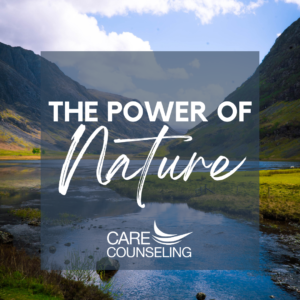The Power of Nature
 In a fast-paced, technology-driven world, many of us find ourselves disconnected from nature. The constant demands of modern life can take a toll on our mental health, leading to increased stress, anxiety, and depression. However, there is a potent remedy available to us, one that has existed since the beginning of time – the healing power of nature through ecotherapy.
In a fast-paced, technology-driven world, many of us find ourselves disconnected from nature. The constant demands of modern life can take a toll on our mental health, leading to increased stress, anxiety, and depression. However, there is a potent remedy available to us, one that has existed since the beginning of time – the healing power of nature through ecotherapy.
What is Ecotherapy?
Ecotherapy, also known as nature therapy or green therapy, is an alternative form of therapy that embraces the natural world as a means of healing and restoring mental health. It recognizes the vital connection between humans and nature and utilizes this bond to foster emotional well-being. Ecotherapy is not a new concept; indigenous cultures have long understood and practiced the healing properties of nature.
The Benefits of Ecotherapy for Mental Health
- Stress Reduction
One of the most significant benefits of ecotherapy is its ability to reduce stress. Nature has a calming effect on the mind, helping to lower cortisol levels and regulate stress hormones. A leisurely walk in the woods, sitting by a babbling brook, or simply gazing at the stars can alleviate anxiety and induce a sense of tranquility. In a study published in the Journal of Environmental Psychology, researchers found that spending time in nature significantly reduced levels of stress and improved overall mood.
- Anxiety Management
The natural environment can help individuals manage anxiety disorders more effectively. Engaging in ecotherapy activities, such as gardening or hiking, can provide a sense of purpose and accomplishment, which can counteract feelings of helplessness and restlessness associated with anxiety. Additionally, exposure to green spaces has been linked to a decrease in symptoms of generalized anxiety disorder, as per a study in the International Journal of Environmental Health Research.
- Improved Cognitive Function
Spending time in nature can boost cognitive function and enhance focus and attention. Regular interactions with natural surroundings have been shown to improve memory, problem-solving abilities, and creativity. Ecotherapy promotes mental clarity, enabling individuals to feel more centered and focused on their daily lives.
- Enhanced Mood and Well-being
Nature has a positive impact on mood and overall well-being. Being in green spaces triggers the release of endorphins, the feel-good hormones that lift our spirits and enhance a sense of happiness. A review published in the International Journal of Environmental Research and Public Health suggested that ecotherapy interventions were associated with a significant improvement in psychological well-being and life satisfaction.
- Social Connection
Participating in ecotherapy can also foster social connections and alleviate feelings of isolation or loneliness. Group ecotherapy sessions, such as community gardening or nature-based support groups, allow individuals to connect with like-minded people in a non-judgmental and nurturing environment. These interactions can be particularly beneficial for those struggling with social anxiety or depression.
- Coping with Trauma
Nature offers a safe and non-threatening space for individuals to process traumatic experiences. The peaceful and accepting atmosphere of the natural world allows for reflection, introspection, and emotional healing. Ecotherapy provides a gentle path for trauma survivors to rebuild their resilience and regain a sense of control in their lives.
- Increased Physical Activity
Engaging in outdoor activities as part of ecotherapy can lead to increased physical activity, which, in turn, promotes better mental health. Regular exercise, especially in natural settings, has been linked to reduced symptoms of depression and improved overall health.
In the hustle and bustle of modern life, we often overlook the simple yet profound power of nature to heal and rejuvenate our minds. Ecotherapy, with its deep-rooted connection to the natural world, offers a holistic approach to mental health and well-being.
The benefits of ecotherapy extend beyond the individual, positively impacting communities, and the environment. By embracing ecotherapy and incorporating nature into our daily lives, we can take a step towards a healthier and more balanced existence. So, let us take a moment to disconnect from our screens, step outside, and let the therapeutic embrace of nature work its
wonders on our minds.



























